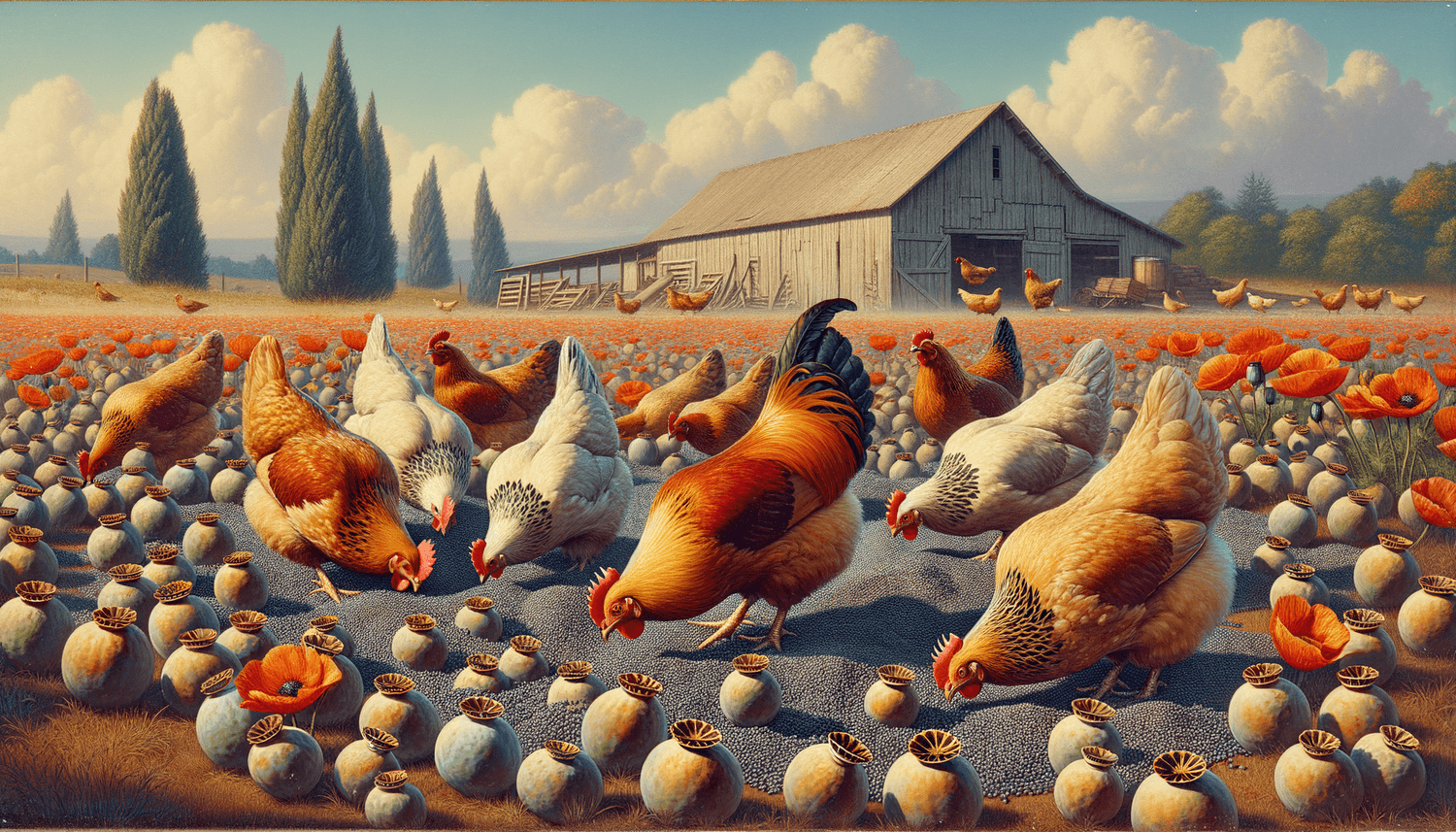Welcome, fellow poultry enthusiasts! Today we’re diving into an intriguing question that has chicken keepers around the world scratching their heads (much like our feathered friends): can chickens eat poppy seeds? As backyard chicken connoisseurs, it’s important to ensure our beloved birds maintain a balanced diet, all while being cautious of any potential benefits or risks tied to unfamiliar treats. So, let’s descend into the wonderland of poppy seeds, unearthing their nutritional value and how to prepare this tiny, yet captivating food for our inquisitive cluckers!
Can chickens eat poppy seeds?
Yes, chickens can safely eat poppy seeds! Poppy seeds are non-toxic to chickens and make for a fun, nutritious treat when fed in moderation. As with any treat or supplement, it’s essential to balance their consumption with a well-rounded, primary diet of quality chicken feed.
Finding the perfect balance in your chickens’ diet
Just like humans, chickens require a well-rounded and balanced diet to stay healthy and thrive. A chicken’s diet should primarily consist of a high-quality chicken feed, which should make up around 80-90% of their daily intake. Chicken feed is specifically formulated to provide all the necessary nutrients, vitamins, and minerals that your flock needs to grow, lay eggs, maintain proper digestion and support a healthy immune system. Thus, it’s essential not to deviate too far from this foundation.
Now, let’s talk about that fun 10-20% of their dietary needs. Besides the staple chicken feed, our feathered friends love the adventure of snacking on tasty treats like fruits and vegetables! These tasty morsels not only satisfy their curiosity and palate but also offer additional vitamins, minerals, and antioxidants that can further promote health and happiness within the flock. Just remember, moderation is key! Too many treats could lead to an imbalanced diet and health issues down the road. So, stick to giving treats mindfully and make sure your chickens get their fair share of chicken feed each day.
Nutritional value of poppy seeds for chickens.
Feeding poppy seeds to chickens can offer some nutritional benefits as these tiny seeds pack quite the punch when it comes to nutritional content. They contain a good amount of protein, which is essential for optimal growth, feather development, and egg production in chickens. In addition to protein, poppy seeds are also rich in fiber that can aid in digestion and help maintain a healthy gut in chickens.
Poppy seeds also provide some essential vitamins and minerals that contribute positively to the overall health of your flock. For instance, they are a source of calcium, which is crucial for strong eggshells and skeletal development. Moreover, poppy seeds contain significant amounts of magnesium, phosphorus, zinc, and manganese, which collectively promote proper functioning of various physiological processes in chickens, ranging from muscle and nerve function to immunity support and energy metabolism.
Furthermore, poppy seeds also contain omega-3 and omega-6 fatty acids that are beneficial to your chickens’ overall health. These essential fatty acids play a vital role in maintaining healthy feathers, skin, and egg production while also supporting immune function and reducing inflammation. However, it’s important to remember that poppy seeds should be fed in moderation, not as a primary source of nutrition, in order to maintain a diverse and nutritious diet for your chickens.
Nutrition table of poppy seeds for chickens.
| Information | Description |
|---|---|
| Nutritional Value | High in protein, fiber, vitamins, minerals, omega-3, and omega-6 fatty acids |
| Suggested Serving Size | A small handful or a teaspoon per bird, fed occasionally as a treat |
| Safe Feeding Practices | Ensure poppy seeds are clean, dry, and free from mold or contaminants; feed in moderation |
| Preparation | Can be fed raw, mixed into their regular feed, or combined with other treats |
| Potential Risks | Excess consumption may lead to an imbalanced diet or reduced feed intake |
| Hydration | Poppy seeds do not provide hydration, ensure fresh water is always available |
| Digestion | The fiber content in poppy seeds supports healthy digestion and gut function |
| Seasonal Availability | Available year-round in most locations |
| Other Benefits | Encourages natural foraging behavior, provides mental stimulation, and adds variety to their diet |
How to introduce poppy seeds to your flock
If you have decided to share the nutritious treat of poppy seeds with your chickens, begin by introducing a small amount and monitoring their reaction. Chickens can be quite selective, and individual preferences may vary. Make sure that the poppy seeds are clean, dry, and free from mold or contaminants. You can scatter a small handful on the ground for your flock to peck at or mix it into their feed to encourage natural foraging behavior and maintain diversity in their diet.
Alternative treats to consider
If you’re feeling adventurous and want to offer your flock some variety, there are several alternative treats to consider. Chickens love fruits and vegetables like leafy greens, berries, melons, and squash, which can provide an excellent source of additional vitamins, minerals, and hydration. Other popular options include mealworms, black soldier fly larvae, and even scrambled eggs. Remember, it is crucial to maintain a balance and not to rely solely on treats for your chickens’ nutritional needs.
Keeping your flock healthy and happy
Feeding your backyard chickens a diverse and balanced diet is fundamental to maintaining their overall health and happiness. By offering occasional treats like poppy seeds, you can enhance their dietary experience while providing essential nutrients and promoting natural behaviors. It’s a rewarding process for both you and your feathered friends, but always remember moderation is key to avoiding health issues down the road.

















